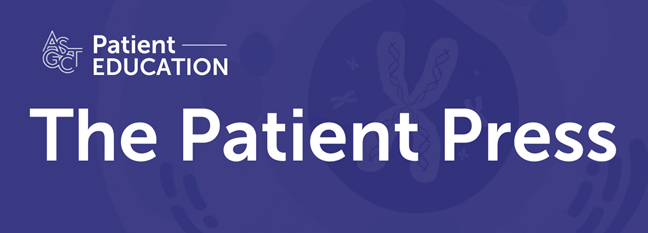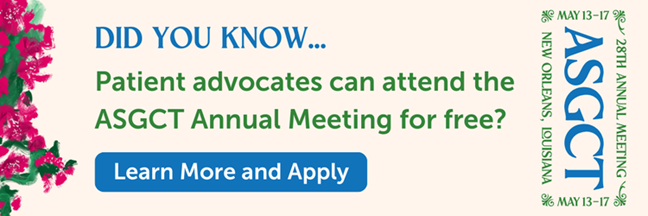February 2025
Providing timely updates for the patient advocate community!
Subscribe to The Patient Press
In This Issue:

Time-Sensitive Sign-On Letter
🔬Support NIH Research Funding
The American Society of Gene & Cell Therapy (ASGCT) has been closely monitoring plans to cap the NIH Facilities & Administration (F&A) rate. We are engaging with Congress to protect these vital research funds and support overall NIH research funding. Proposed cuts, including capping F&A reimbursements at 15%, could threaten future progress toward new therapies for serious and rare diseases.
We invite patient advocacy organizations, academic institutions, and other nonprofits to sign this group letter to congressional appropriators requesting A) their support for NIH funding overall and B) their commitment to reaffirm current statutory arrangements for F&A cost reimbursements. To participate in this important initiative, complete this form by March 4 at 12 p.m. ET. Thank you to those organizations who have already signed the letter.
Our goal is to bring the collective voice of the biomedical research community to Capitol Hill; for that reason ASGCT also signed onto Research!America's community letter to appropriators on this topic. We firmly believe that robust and stable research funding is essential to maintain US leadership in biomedical innovation and expand patient access to breakthrough therapies.
Events

📢 Calling All Patient Advocates: Attend #ASGCT2025
ASGCT’s Annual Meeting May 13 – 17 is quickly approaching, so it’s a great time to start making your plan to be there. Patient advocates, caregivers, and individuals impacted by a rare disease and interested in cell and gene therapies are encouraged to apply to attend the meeting for free. If selected, awardees are also invited to exclusive networking events, and patient-focused sessions, including a half-day workshop on The Business of Advocates Advancing CGTs. Review all opportunities for the patient community to attend and apply before April 1.
📅 The Empowering Patients Summit Is Two Weeks Away!
The Empowering Patients 2025: A Cell and Gene Therapy Summit will be held on March 12 and 13. Register for the free virtual event to gain access to educational sessions and participate in live discussions. Sessions will address funding initial research, navigating clinical development, the complexity of CGT clinical trial design, and pathways forward if a development program is deemed not commercially viable. Both speakers and attendees will share their thoughts, questions, and challenges experienced throughout their CGT journey.
🦓 Show Your Stripes on Rare Disease Day
Rare Disease Day is Feb. 28! ASGCT recognizes the importance of raising awareness, generating support and advocating for care and treatments for the 300 million people globally living with a rare disease.
Why a zebra? The zebra is the official mascot for rare disease patients. Historically, medical professionals were told that when they “hear hoofbeats,” they should not expect to see a zebra. In other words, look for the more common answer, a horse. Now, we know that one in ten Americans is actually a zebra! It might not be obvious when you look at us, which is why we show our stripes to raise awareness.
⭐ Supporting Your Family's Wishes: The Value of Advance Directives and Preparing for Complex Medical Decisions
Join the Courageous Parents Network on March 24 to understand how completing healthcare advance directives for and/or with your child can support your family’s goals and wishes. They will explore the importance of discussing and documenting healthcare wishes prior to an emergent or urgent medical event, and quality-of-life considerations related to advance directives.
Resource Hub
🧠 World Epilepsy Day
Feb. 10 marked World Epilepsy Day, a time to raise awareness for the 3.4 million people in the U.S. living with the condition, including 470,000 children. We recognize the incredible efforts of the epilepsy community working toward better treatments, with research underway on gene therapy approaches like gene addition and gene editing.
👁️ Low Vision Awareness Month
Check out our resources on Inherited Retinal Disorders (IRDs) and how gene therapy can be delivered into the eye to slow or stop the progression of vision loss. Low Vision Awareness Month in February focuses on raising awareness about conditions like retinitis pigmentosa, Stargardt disease, and Leber congenital amaurosis (LCA) that impair vision, and highlighting advances in research for those living with visual challenges.
💡 Enroll in NORD's Rare Disease Drug Development Series
Enroll in The National Organization for Rare Disorders (NORD) educational series to learn how to actively engage in the drug development process for your or your loved one’s disorder. This three-part online series covers pre-clinical research through navigating FDA reviews and clinical trials, including every necessary step in bringing new treatments to patients.
🧡 Help Fuel Change for the Rare Disease Community
Join the first ever large-scale study in the U.S., NORD’s Living Rare Study, working to examine how the experiences and challenges of people impacted by rare disease changes over time. The more people who join the Living Rare Study, the more powerful the data becomes.
⚕️ Read New Patient Focused Policy Articles
🚀 White Paper Highlights Community Engagement to Improve Clinical Trial Feasibility
Global Genes released a white paper highlighting how early, sustained patient engagement boosts rare disease trial success, cutting costs and timelines. It urges biopharma to adopt patient-centric strategies for better protocol design, recruitment, and retention.
👂 CBER Hears from Patients, Caregivers about Early Enrollment in CGT Clinical Trials
Read a recap and watch the recording of FDA's Center for Biologics Evaluation and Research (CBER) listening meeting held December 4, 2024. It was the second part of their CGT series, with the topic focused on Patient and Care Perspectives on Early Enrollment into Gene and Cell Therapy Clinical Trials for Rare Diseases. The event reflected the hopes, challenges, and realities of pursuing life-changing therapies while exploring options to preserve quality of life for those with a rare condition.
⚙️ FDA’s Rare Disease Innovation Hub Releases Strategic Agenda
Check out FDA’s new Rare Disease Innovation Hub 2025 strategic agenda. The Hub was created to enhance collaboration between Agency divisions, advancing rare disease therapies and improving outcomes for patients. In mid-January FDA released a plan highlighting goals to advance regulatory science through novel trial designs and biomarker development, strengthen coordination between CDER and CBER, and serve as a central point of contact for external partners.
🧬 Read the Q4 2024 Gene, Cell and RNA Therapy Landscape Report
Check out ASGCT and Citeline's Q4 landscape report to explore existing CGT product approvals, the shift in diseases being targeted for certain modalities, and the upcoming gene therapy pipeline. Highlights include approvals across three modalities: Aucatzyl for acute lymphocytic leukemia, RegeneCyte for blood disorders, and Tryngolza for lipoprotein lipase deficiency.
Breakthrough Moments
.png)
🔜 Upcoming FDA Decision Dates
Neurotech Pharmaceuticals NT-501 is an investigational implantable cell therapy for the treatment of patients with macular telangiectasia (MacTel). FDA granted NT-501 Priority Review and is expected to make a decision on its approval by March 18.
🏛️ Policy Updates
Medicaid update - Lawmakers in Congress are considering a wide range of cuts and changes to the Medicaid program over the next decade. These reductions could involve capping federal Medicaid spending per enrollee, changing the federal medical assistance percentage (FMAP) formula, or eliminating enhanced federal match rates for ACA expansion populations. If any of those policies were enacted, states would need to either increase Medicaid funding through their own state budgets or reduce services for enrollees. Other Congressional proposals that could impact Medicaid enrollment include the imposition of work requirements.
The proposed Medicaid cuts are tied to broader budget reconciliation efforts [CM1] to offset costs such as tax cuts and border security. Medicaid is a critical payer for innovative medicines including CGTs for rare diseases. Advanced therapies already face challenges with coverage and reimbursement [CM3] under the current public payor system. Cuts to states’ federal Medicaid funding could further limit access by biasing patient care away from high-value, high-cost CGTs [CM4] or by fully eliminating patients’ Medicaid eligibility. ASGCT supports policies that promote robust and timely patient access to gene and cell therapies, which are at the forefront of medical innovation.
📰 Rare in the News
Autoimmune Disorders - CAR T-cell therapy treatments show promise of remission to patients, some with organ failure from severe lupus, by offering a complete reset of their immune system. This innovative treatment involves reprogramming a patient’s T cells to target and eliminate faulty B cells that drive autoimmune attacks.
Biomarkers - For the first time ever, FDA is considering approval for three new drugs based on biomarkers rather than traditional placebo trials. This groundbreaking move could make it easier to develop treatments for ultra-rare diseases in locations where running large clinical trials is often impractical.
Duchenne Muscular Dystrophy (DMD)* - Sarepta reported that DMD patients treated with ELEVIDYS showed significant improvements in key functional performance measures, even after a year of aging, during part 2 of the EMBARK study. No new safety concerns were reported.
GM1 Gangliosidosis* - GemmaBio announced that it is targeting conditions like GM1 gangliosidosis, a fatal neurodegenerative disorder more prevalent in Brazil.
Hemophilia A* - Pfizer has terminated its partnership with Sangamo Therapeutics for their hemophilia A gene therapy despite the therapy's positive Phase 3 clinical trial results. The decision is attributed to market factors and slow uptake of gene therapies in moderate-to-severe hemophilia A patients.
Hemophilia B* - Pfizer is discontinuing its hemophilia B gene therapy, Beqvez, due to a lack of patient and physician interest. Since its FDA approval last April, no patients have received the $3.5 million treatment.
Spinal Muscular Atrophy (SMA)* - ICER announced plans to compare and assess the clinical effectiveness and value of treatments for spinal muscular atrophy (SMA), including reviewing new evidence on the clinical effectiveness of gene therapies Spinraza and Zolgensma.
Transplant Complications - FDA rejected Atara Biotherapeutics and Pierre Fabre's T-cell therapy, tabelecleucel (tab-cel), for treating an Epstein-Barr virus-related transplant complication. The Complete Response Letter (CRL) was based on concerns with third-party manufacturing site, and not the therapy's safety, efficacy, or production quality. A new clinical trial will not be required, and Atara has said it plans to resubmit its application in the coming months.
SLC6A1 - A mother and former financial analyst is raising $1 million to develop a gene therapy for her son Maxwell, who has an ultra-rare SLC6A1 disorder. Beyond traditional fundraising, Amber Freed is offering naming rights to the therapy to the highest donor. With limited biotech interest and setbacks, these creative efforts reflect the numerous challenges parents face in funding treatments for ultra-rare diseases.
*Learn more
Visit ASGCT's patient-friendly resources on gene therapy for these diseases:
Stay up to date on the latest patient-focused resources, events, and more by subscribing to this newsletter and/or forwarding to someone who might be interested.
Subscribe to The Patient Press